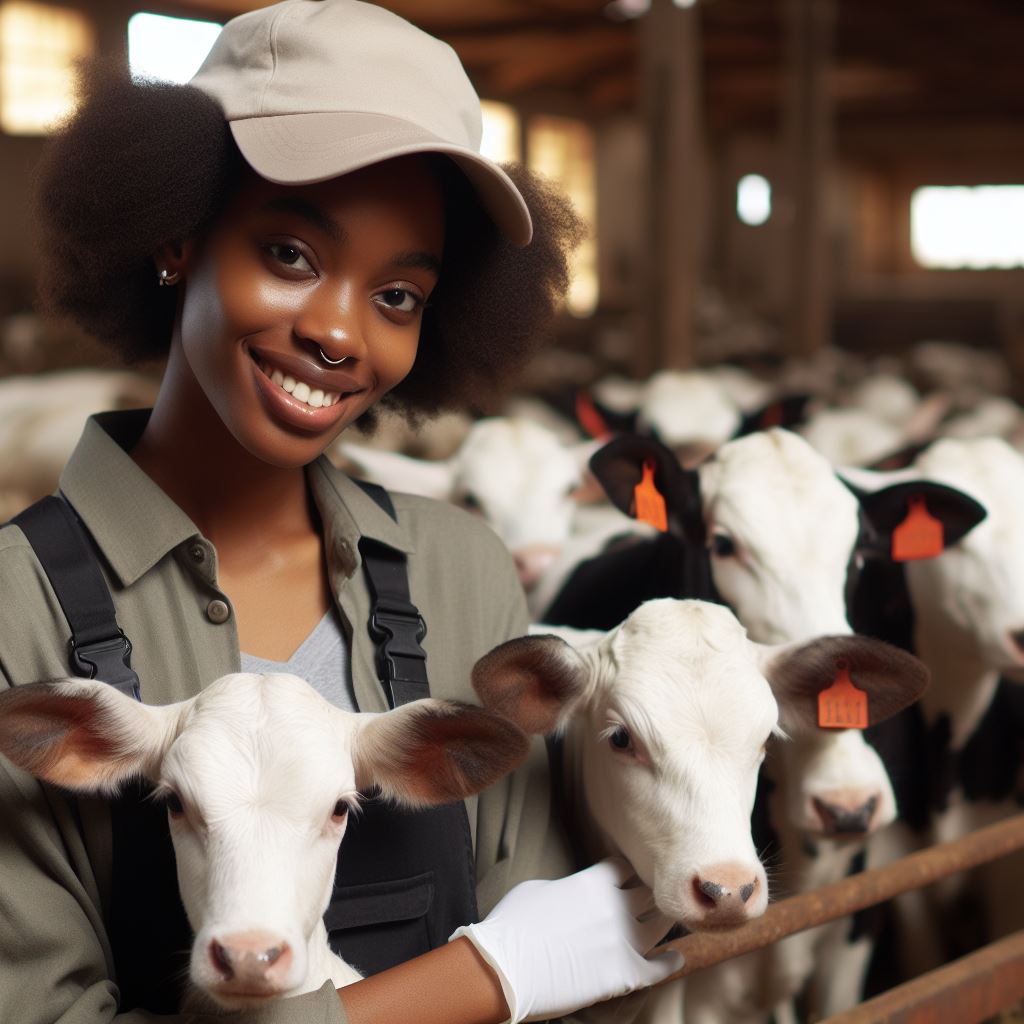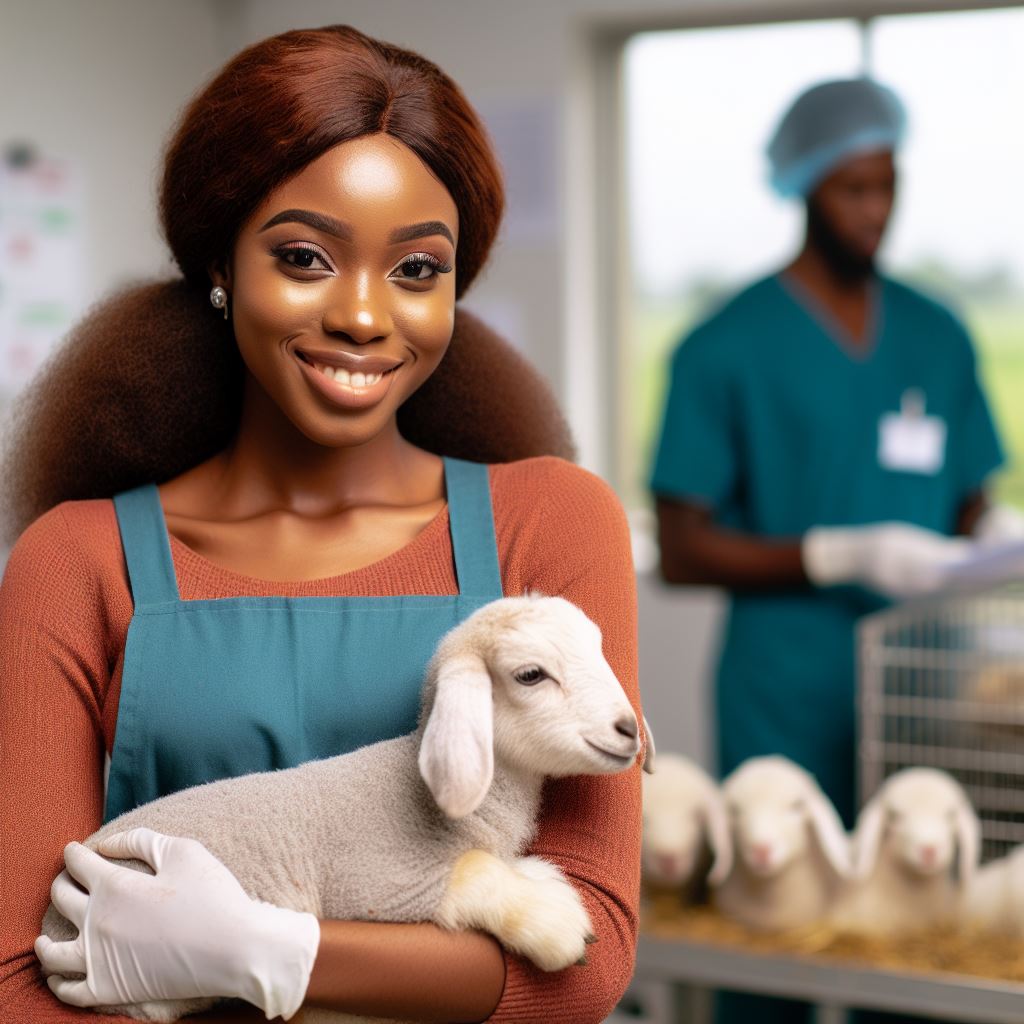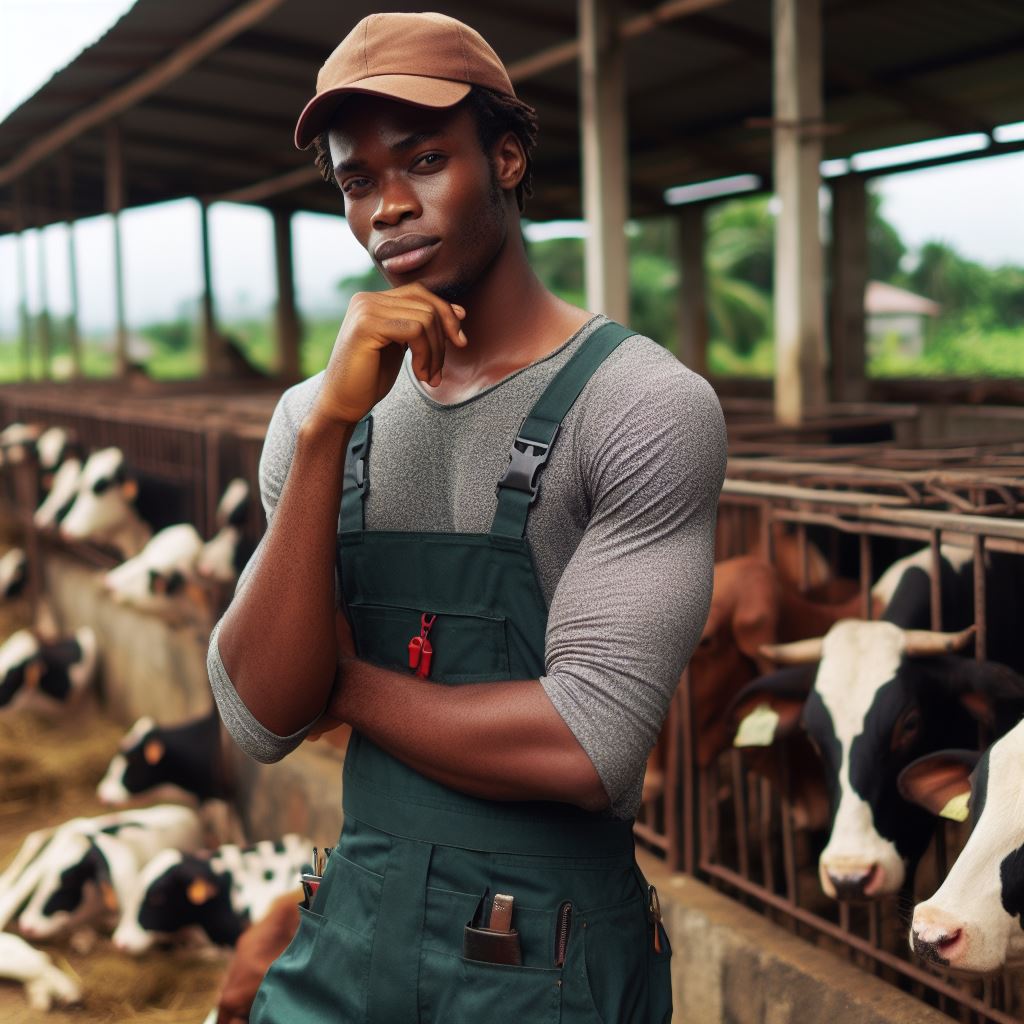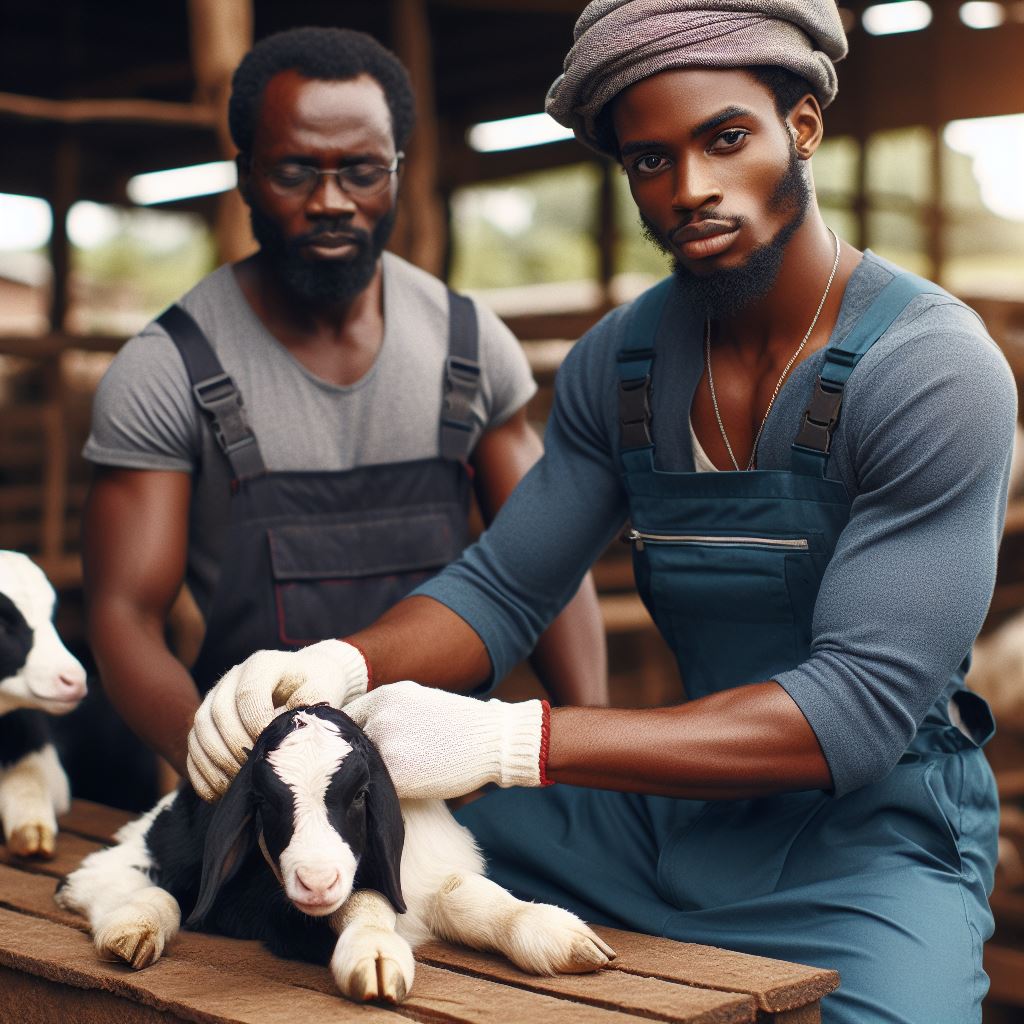Introduction
In Nigeria, animal production stands as a pivotal sector, offering diverse career avenues and fostering economic growth.
Vital to food security and income generation, this industry plays a crucial role in Nigeria’s agricultural landscape.
Notably, it encompasses livestock farming, poultry, and aquaculture, contributing substantially to the nation’s GDP.
The significance of animal production in the Nigerian job market is undeniable.
It not only addresses nutritional needs but also fuels a thriving job market, providing employment opportunities across various skill sets.
From animal husbandry and veterinary care to agribusiness management and research, the sector welcomes a spectrum of professionals.
Moreover, the increasing demand for animal products amplifies the need for skilled individuals in production, processing, and marketing.
As we delve into this exploration, discover the promising career prospects that await in the dynamic realm of animal production in Nigeria.
Scope of Animal Production in Nigeria
Overview of animal production industry
The animal production industry in Nigeria encompasses various sectors that contribute to the country’s economy.
Major sectors within animal production
- Livestock farming: This sector involves the rearing and breeding of livestock for meat, milk, and other byproducts.
- Poultry farming: Poultry farming focuses on the production of chicken, turkey, and other birds for meat and eggs.
- Fish farming: Fish farming involves the cultivation of fish species for commercial purposes, contributing to the nation’s fish supply.
- Animal feed production: This sector is responsible for the manufacturing of animal feed to meet the nutritional needs of livestock.
- Veterinary services: Veterinary services play a crucial role in ensuring the health and well-being of animals in the production industry.
Importance of animal production for food security and economic development
Animal production plays a vital role in ensuring food security and driving economic development in Nigeria.
The importance of animal production can be highlighted in the following ways:
- Food security: Animal production provides a significant source of meat, milk, eggs, and fish, which are essential protein sources for the population.
- Job creation: The industry contributes to employment opportunities, particularly in rural areas, where farming activities are predominant.
- Income generation: Animal production serves as a source of income for farmers, traders, and other stakeholders along the value chain.
- Foreign exchange earnings: Nigeria can export animal products to earn foreign exchange, contributing to the country’s foreign reserves.
- Improved nutrition: Animal production ensures the availability of nutritious food, addressing malnutrition and promoting a healthier population.
- Rural development: The animal production industry can drive rural development by attracting investments, improving infrastructure, and promoting economic growth in rural communities.
- Technology transfer: The sector encourages the transfer of modern farming practices and technologies, fostering agricultural innovation in Nigeria.
- Sustainable agriculture: Animal production can adopt sustainable farming practices to promote environmental conservation and climate change mitigation.
- Contribution to GDP: The industry contributes significantly to Nigeria’s Gross Domestic Product (GDP) and overall economic development.
Read: Overcoming Challenges in Animal Breeding Research in Nigeria
Job Roles and Responsibilities
In the field of animal production in Nigeria, various job roles and responsibilities exist.
These roles are essential for the successful management and operation of different sectors within the industry.
Let’s explore some of these roles in detail:
Transform Your Career with Expert Guidance
Get personalized mentorship consulting that’s tailored to your unique path. Our expert advice is actionable and exclusive.
Get StartedLivestock farming
Livestock farmers play a crucial role in animal production. They employ animal husbandry techniques to ensure the well-being and productivity of livestock.
This includes proper housing, nutrition, and overall care for the animals.
They also manage the breeding and reproduction processes to maintain and improve desirable traits in the animals.
Additionally, they implement health and sanitation practices to prevent and control diseases in livestock populations.
Poultry farming
Poultry farming involves raising chickens for meat and egg production. Within this sector, different job roles exist.
For broiler farming, individuals focus on raising chickens for meat production. They oversee the growth, health, and proper nutrition of the broiler chickens throughout their growth cycle.
In contrast, layer farming involves rearing hens specifically for egg production. Layer farmers ensure that hens receive optimal care to maximize egg production and quality.
Additionally, hatchery management is essential in poultry farming to successfully incubate and hatch eggs, ensuring healthy chicks.
Fish farming
Fish farming, also known as aquaculture, is an important aspect of animal production. Fish farmers are responsible for constructing and maintaining ponds, which serve as the habitat for fish.
They employ various breeding and feeding methods to promote optimal growth and reproduction of fish.
Additionally, fish farmers implement effective disease management strategies to prevent and control diseases that can affect fish populations.
Animal feed production
The production of high-quality animal feed is vital for the proper nutrition of livestock and poultry.
Individuals working in animal feed production are responsible for sourcing and processing raw materials needed to create balanced animal diets.
They ensure the formulation of feed recipes that contain the necessary nutrients for the animals’ growth and overall health.
Transform Your Ideas Into Impactful Words
Struggling to express your thoughts? Let us craft academic papers, articles, or blog posts that captivate, clarify, and connect with your audience.
Get StartedVeterinary services
Veterinary services are essential for the health and well-being of animals in animal production. Veterinary professionals play a significant role in diagnosing and treating animal illnesses and diseases.
They conduct animal health examinations and administer necessary medical treatments.
Additionally, veterinarians develop and execute vaccination programs to protect animals from common diseases prevalent in the industry.
They also contribute to disease prevention through regular monitoring, testing, and the implementation of preventive measures.
In essence, the field of animal production in Nigeria offers various career opportunities.
From livestock farming to poultry farming, fish farming, animal feed production, and veterinary services, individuals can choose a specific job role that matches their interest and skills.
Each role brings unique responsibilities that contribute to the overall success and sustainability of the animal production industry in Nigeria.
Read: Challenges Faced by Students in Animal Production in Nigeria
Educational Requirements and Skills
Acquiring relevant academic qualifications and developing key skills and competencies are crucial in pursuing a successful career in animal production in Nigeria.
Academic qualifications
When it comes to academic qualifications, a Bachelor’s degree in Animal Science or a related field is considered a basic requirement for entry-level positions in the animal production industry.
This undergraduate degree equips individuals with a solid foundation in animal science, including topics such as animal breeding, nutrition, physiology, and health management.
However, for those looking to take on advanced roles or research opportunities, a Master’s or Ph.D. degree becomes necessary.
These advanced degrees provide individuals with specialized knowledge and expertise in specific areas of animal production, such as genetics, reproduction, or animal nutrition.
In addition to academic qualifications, there are several key skills and competencies that are highly valued in the animal production industry.
Make Your Study Abroad Dream a Reality
Need help navigating the complexities of studying overseas? Let us guide you through the application and visa process, ensuring a smooth journey to your dream destination.
Get StartedOne of the most important skills is having a deep understanding of animal physiology and nutrition.
This knowledge allows professionals to properly assess and meet the nutritional needs of animals under their care.
It also enables them to identify potential health issues and provide appropriate treatment or preventive measures.
Key skills and competencies
Practical skills in animal handling and management are also invaluable in this career.
Professionals should be adept at safely handling and restraining animals, as well as carrying out routine tasks such as vaccinations, deworming, and hoof trimming.
Good animal management skills are essential for maintaining the overall health and well-being of animals in various production settings, including farms, ranches, and zoos.
Another important skillset for individuals in animal production is problem-solving and critical thinking abilities.
Professionals in this field often face complex challenges, such as disease outbreaks, production inefficiencies, or environmental concerns.
Being able to analyze and solve these problems is crucial for ensuring the productivity and sustainability of animal production operations.
Lastly, communication and interpersonal skills are essential for effective interaction with clients, colleagues, and other stakeholders.
Animal production professionals need to be able to clearly convey information, whether it be providing instructions to farm workers or explaining complex concepts to clients.
Strong interpersonal skills are also necessary for building relationships and working collaboratively with others in the industry.
To succeed in the animal production industry in Nigeria, individuals should strive to acquire the necessary academic qualifications and develop the key skills and competencies discussed above.
Continuous learning and staying updated with the latest advancements in the field are also important for career growth and advancement.
Unlock the Full Potential of Your Research
Stuck in your academic research? Whether it’s data analysis, research design, or literature reviews, we offer expert guidance to elevate your work and ensure success.
Get HelpRead: Top Universities in Nigeria for Studying Animal Production

Career and Job Prospects
Employment opportunities in public sector organizations
- The Nigerian government offers various job opportunities in public sector organizations related to animal production.
- These organizations include agricultural research institutes, veterinary clinics, and government-owned farms.
- Job roles in these organizations can range from research scientists to veterinary doctors and farm managers.
- Working in the public sector provides stability, benefits, and opportunities for professional growth.
Private sector industries related to animal production
- The private sector in Nigeria also provides a wide range of career opportunities in the field of animal production.
- Companies engaged in livestock feed manufacturing, animal health products, and animal breeding offer employment prospects.
- Roles in the private sector can include sales representatives, quality control officers, and farm consultants.
- Private sector jobs often offer competitive salaries, incentives, and opportunities to work with cutting-edge technologies.
Entrepreneurial prospects in starting a livestock or poultry farm
- Entrepreneurial individuals have the opportunity to start their own livestock or poultry farms in Nigeria.
- Starting a farm requires knowledge of animal husbandry, business management, and market trends.
- Successful entrepreneurs in animal production can enjoy financial independence and contribute to the country’s food security.
- Government support and funding schemes are available to aspiring entrepreneurs in the agricultural sector.
Advancement opportunities and career growth within the industry
- The animal production industry in Nigeria offers excellent prospects for career advancement and growth.
- Professionals can progress from entry-level roles to supervisory positions and eventually become industry leaders.
- Continuing education, certifications, and participation in relevant workshops can enhance career growth.
- With the growing demand for animal products, there is a continuous need for skilled professionals in the industry.
Basically, the career opportunities in animal production in Nigeria are vast and diverse.
Whether in public sector organizations, private sector industries, or through entrepreneurial endeavors, individuals interested in this field have numerous paths to explore.
From working as research scientists or farm managers to starting their own farms or advancing to leadership positions, there are ample chances for growth and success.
With the government’s support and the country’s increasing focus on agriculture, the animal production industry in Nigeria is expected to flourish, providing exciting career prospects for aspiring individuals.
Read: Guest Lectures: Global Experts on Nigeria’s Animal Genetics Scene
Challenges and Future Outlook
Challenges faced by the animal production industry in Nigeria
- Inadequate infrastructure and technology hinder optimal performance in animal production.
- Lack of access to finance and credit facilities restricts growth and expansion.
- Limited research and development initiatives hamper advancements in the sector.
Potential solutions to address these challenges
- Government support and policies to improve infrastructure, technology, and funding opportunities.
- Collaboration with international organizations for knowledge sharing and technical assistance.
- Promoting investment in the animal production sector to attract private stakeholders.
Positive outlook for the future of animal production in Nigeria
Despite the challenges, the animal production industry in Nigeria holds significant potential for growth and development.
The government’s commitment to improving the sector through various policies and initiatives is a positive sign.
Efforts to enhance infrastructure and technology will enhance productivity and efficiency.
Collaboration with international organizations will provide access to best practices, knowledge, and global networks.
This partnership can help overcome the limitations of research and development, fostering innovation and sustainable practices.
Furthermore, promoting investment in the sector will attract capital and expertise, driving modernization and expansion.
This influx of resources will pave the way for advancements in animal health, genetics, and production techniques.
An increased focus on value addition and processing will open up opportunities for both domestic and international markets.
This will result in higher economic returns and job creation across the entire value chain.
Moreover, the growing demand for animal protein, driven by population growth and changing dietary preferences, presents a promising market for the animal production industry.
Nigeria’s large population provides a substantial consumer base, creating a secure market for farmers and producers.
All in all, while challenges persist, the future of animal production in Nigeria looks promising.
With the right support, policies, and investments, the industry has the potential to flourish, contributing to food security, job creation, and economic growth in the country.
Conclusion
The significance and potential of career opportunities in animal production in Nigeria cannot be overstated.
For individuals interested in pursuing a career in this field, there are numerous avenues to explore and thrive.
By taking advantage of the country’s vast natural resources and growing demand for animal products, aspiring professionals have a chance to make a meaningful impact on both the industry and the economy.
In the end, a career in animal production in Nigeria offers immense potential for growth and success.
Therefore, it is crucial for individuals with a passion for animals and a desire to contribute to sustainable agriculture to seriously consider this field.
Whether it be in livestock farming, poultry production, aquaculture, or veterinary medicine, there is a place for everyone willing to embrace the challenges and rewards of working in animal production.
So, if you have a passion for animals and want to make a difference in Nigeria’s agricultural landscape, start exploring career opportunities in animal production today!




